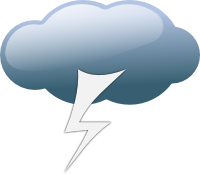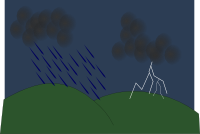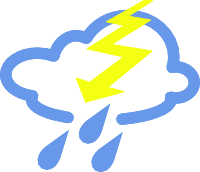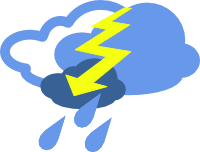Associations to the word «Storming»
Noun
- Mage
- Landfall
- Howling
- Fury
- Rage
- Surge
- Hurricane
- Gunman
- Protester
- Utc
- Militant
- Typhoon
- Mph
- Convection
- Cyclone
- Redoubt
- Citadel
- Chaser
- Demonstrator
- Mob
- Flooding
- Thunderstorm
- Gust
- Hostage
- Rainfall
- Barricade
- Fortress
- Shear
- Tornado
- Commando
- Stronghold
- Advisory
- Tempest
- Blizzard
- Lull
- Snowfall
- Depression
- Thunder
- Insurgent
- Bayonet
- Donetsk
- Lightning
- Forecast
- Runoff
- Siege
- Hail
- Breach
- Wind
- Intensity
- Sewer
- Parliamentarian
- Trough
- Katrina
- Royalist
- Kickoff
- Azores
- Rain
- Antilles
- Garrison
- Galveston
- Earthwork
Adjective
Verb
Adverb
Pictures for the word «Storming»
Wiktionary
STORM, noun. Any disturbed state of the atmosphere, especially as affecting the earth's surface, and strongly implying destructive or unpleasant weather.
STORM, noun. A violent agitation of human society; a civil, political, or domestic commotion; violent outbreak.
STORM, noun. (meteorology) a wind scale for very strong wind, stronger than a gale, less than a hurricane (10 or higher on the Beaufort scale).
STORM, noun. (military) A violent assault on a stronghold or fortified position.
STORM, verb. (intransitive) (with adverbial of direction) To move quickly and noisily like a storm, usually in a state of uproar or anger.
STORM, verb. (transitive) To assault (a stronghold or fortification) with military forces.
STORM, verb. (impersonal) To have the weather be violent, with strong winds and usually rain, thunder, lightning, or snow.
STORM CELLAR, noun. An underground structure used to shelter from storms that have high winds, such as a tornado.
STORM CELLARS, noun. Plural of storm cellar
STORM CHASER, noun. One who chases storms as a profession and/or hobby.
STORM CHASER, noun. One who finds and films storms, especially tornados.
STORM CLOUD, noun. A large rain cloud, with potential to bring a storm.
STORM CLOUDS, noun. Plural of storm cloud
STORM DOOR, noun. A door normally leading to a cellar or a basement, for protection from a tornado or a violent storm
STORM DOORS, noun. Plural of storm door
STORM DRAIN, noun. (US) An access point or conduit for rainwater that drains directly downstream in a (drainage) basin without going through sewers or water treatment in order to prevent or belay floods
STORM DRAINS, noun. Plural of storm drain
STORM IN A TEA-KETTLE, noun. Alternative form of storm in a teacup: synonym of tempest in a teapot.
STORM IN A TEACUP, noun. (UK) Synonym of tempest in a teapot.
STORM IN A TEAPOT, noun. Alternative form of storm in a teacup: synonym of tempest in a teapot.
STORM JIB, noun. (nautical) A small jib, used in a storm to reduce the sail area to the minimum required for maintaining manoeuvrability of the vessel.
STORM JIBS, noun. Plural of storm jib
STORM MATCH, noun. A match coated with a combustible compound that can continue to burn even in a strong wind.
STORM OFF, verb. (idiom) to leave somewhere angrily
STORM OUT OF THE BLOCKS, verb. (idiomatic) To begin rapidly.
STORM PETREL, noun. Any of several small seabirds, of the family Hydrobatidae, having dark plumage and a white rump.
STORM PETRELS, noun. Plural of storm petrel
STORM SEWER, noun. An underground sewer or open canal for channeling surface runoff (as from a rain storm); distinct from a sanitary sewer.
STORM SEWERS, noun. Plural of storm sewer
STORM SURGE, noun. An unusual rise in sea level on a coast due to the action of high winds.
STORM TIDE, noun. A rise in local sea level caused by the combination of regular tides and a storm surge.
STORM TIDES, noun. Plural of storm tide
STORM TROOPER, noun. A German soldier trained in special infiltration tactics, introduced around the end of World War I.
STORM TROOPERS, noun. Plural of storm trooper
STORM WINDOW, noun. A detachable second window attached on the exterior side of a window in climates with harsh winters, to add an insulating layer of still air between the outside and inside.
STORM WINDOWS, noun. Plural of storm window
Dictionary definition
STORM, noun. A violent weather condition with winds 64-72 knots (11 on the Beaufort scale) and precipitation and thunder and lightning.
STORM, noun. A violent commotion or disturbance; "the storms that had characterized their relationship had died away"; "it was only a tempest in a teapot".
STORM, noun. A direct and violent assault on a stronghold.
STORM, verb. Behave violently, as if in state of a great anger.
STORM, verb. Take by force; "Storm the fort".
STORM, verb. Rain, hail, or snow hard and be very windy, often with thunder or lightning; "If it storms, we'll need shelter".
STORM, verb. Blow hard; "It was storming all night".
STORM, verb. Attack by storm; attack suddenly.
Wise words
Abuse of words has been the great instrument of sophistry
and chicanery, of party, faction, and division of society.











